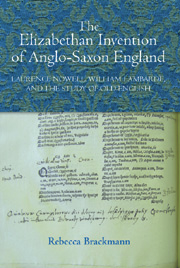 The Elizabethan Invention of Anglo-Saxon England
The Elizabethan Invention of Anglo-Saxon England Book contents
- Frontmatter
- Contents
- List of Illustrations
- Dedication
- Acknowledgements
- Chapter 1 The Anglo-Saxonists and Their Books: Print, Manuscript, and the Circulation of Scholarship
- PART I ANGLO-SAXON TEXTS AND SIXTEENTH-CENTURY ENGLISH
- PART II CHOROGRAPHIES AND THE PAST OF ENGLAND
- PART III OLD ENGLISH AND THE COMMON LAW
- Conclusion: The Invention of Anglo-Saxon England
- Bibliography
- Index
- Title in the Series
Chapter 1 - The Anglo-Saxonists and Their Books: Print, Manuscript, and the Circulation of Scholarship
Published online by Cambridge University Press: 05 February 2013
- Frontmatter
- Contents
- List of Illustrations
- Dedication
- Acknowledgements
- Chapter 1 The Anglo-Saxonists and Their Books: Print, Manuscript, and the Circulation of Scholarship
- PART I ANGLO-SAXON TEXTS AND SIXTEENTH-CENTURY ENGLISH
- PART II CHOROGRAPHIES AND THE PAST OF ENGLAND
- PART III OLD ENGLISH AND THE COMMON LAW
- Conclusion: The Invention of Anglo-Saxon England
- Bibliography
- Index
- Title in the Series
Summary
We wish to argue that the early modern must be defined not in distinction from the medieval but through it, that the urge to periodise and the development of the concept of nationhood are wholly interpenetrated, and that the reading of the medieval in early modern England has in several ways bequeathed to us our understanding of both the medieval and the early modern.
So David Matthews and Gordon McMullan, in the introduction to their Reading the Medieval in Early Modern England, set forth what has become a key issue in discussions of early modern historical writing and antiquarianism in England—the degree to which medieval studies exists as a product of early modern ideological and, particularly, nationalistic goals. The very act of separating ‘medieval’ and ‘early modern’ (or, especially, ‘Renaissance’) is agreeing to the terms of use laid down by sixteenth century scholars, as James Simpson argues in the same volume: ‘when we draw lines sharply between periods whole unto themselves, wherever we draw the line, we are already falling victim to the logic of the revolutionary moment’ of Reformation historiography. Because we have allowed this divide to shape our work, and even our institutional structures, ‘the study of the seventh to the fifteenth centuries is every bit as much a study of the sixteenth to the nineteenth centuries.’
- Type
- Chapter
- Information
- The Elizabethan Invention of Anglo-Saxon EnglandLaurence Nowell, William Lambarde, and the Study of Old English, pp. 1 - 26Publisher: Boydell & BrewerPrint publication year: 2012


